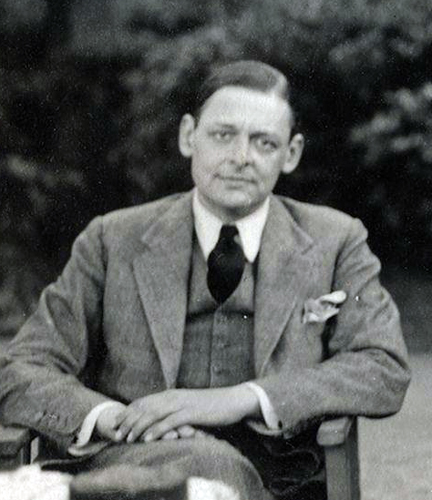What Is “The Love Song of J. Alfred Prufrock” About?
“The Love Song of J. Alfred Prufrock,” like much of T. S. Eliot’s work, questions societal norms and points out the flawed living of empty social rituals and linguistic cliches (Damrosch 733). It is a story that echoes into today’s hollow society and tells the tale of one man’s experience with unrequited love and greater longing for something bigger than “tea and cakes and ices” (Eliot 736).
A product of his times, our main man seems to feel out of place—and rightfully so. J. Alfred Prufrock, our pessimistic protagonist, seeks more profound meaning in the seemingly meaningless actions of those around him, using powerful literary devices to pull the reader deep into his world. He is stifled by their petty standards and feels helpless. At the same time, he grapples with his feelings for a woman whom he thinks wouldn’t understand his hesitations.
Prufrock is caught between his own dismal introspection and the longing for a companion who is part of the problem. “The Love Song of J. Alfred Prufrock” grapples with unbridled emotions and deep introspection that hits the reader and entices them to think past their own reservations. While it depicts the time, it still holds meaning for many of us in a more modern era.

The Effects of T. S. Eliot’s Writing
This distress that so many felt with modern life was carried by Elliot across nations, where his American writing style edited the British canon. As a naturalized British citizen who was born and raised in the southern United States, he worked as an editor and laid the foundation for what was to be known as New Criticism, a literary model widely utilized by universities across English-speaking nations at the time (733).
While many literary experts consider a set of four poems called the Four Quartets to be his crowning achievement, “The Love Song of J. Alfred Prufrock” is what first thrust Eliot into London’s literary scene (733). While it is a meaningful piece of work in its own right, the poem is often seen as a counterpoint to the dramatic monologue written by the nineteenth-century poet Robert Browning (733).
Allusions and Literary References
“The Love Song of J. Alfred Prufrock” begins with a quote from Dante Alighieri’s Inferno in the original Italian, the first of many outside literary references Eliot makes. The poem seems steeped in allusions, which lends an air of authority to J. Alfred Prufrock’s narrative. This literary device also gives the reader an impression that Prufrock is well-educated and intelligent, hinting at his middle or upper-class status in society.
The poem later employs several Biblical references; the first occurrence is a direct mention of the story of Lazarus, while the others allude to lesser-known stories, such as John the Baptist’s death when referring to his head upon a platter, as well as the passages in Ecclesiastes 3:1-8 that refer to a time to murder and create (Eliot 734). In addition to adding a somber tone throughout the poem, it also gives the reader a lens to see Prufrock’s true self; a quiet man with deep knowledge and passive acceptance. With a Biblical backdrop, one can see that Prufrock, in some ways, adheres to the social conventions at the time and is in touch with at least some of them—even if it is begrudgingly so.
“The Love Song of J. Alfred Prufrock” also alludes to Shakespeare’s Hamlet, with Prufrock pointing out that he is not as courageous and is happy as (sarcastically so, one could presume) “an attendant lord… deferential, glad to be of use” and not Prince Hamlet (Eliot 734). He is once again showing his meek nature and unwillingness to take a leading role in even his own life.
No! I am not Prince Hamlet, nor was meant to be; Am an attendant lord, one that will do To swell a progress, start a scene or two, Advise the prince; no doubt, an easy tool, Deferential, glad to be of use, Politic, cautious, and meticulous; Full of high sentence, but a bit obtuse; At times, indeed, almost ridiculous— Almost, at times, the Fool. — Lines 111-119, “The Love Song of J. Alfred Prufrock”
J. Alfred Prufrock’s Perception of Himself
One of the first things the reader notices is Prufrock’s self-doubt and social awkwardness, continuously recounting how others may make fun of his physical features at his every action, from the turning of his head (“They will say: How his hair is growing thin!”) to his choice of apparently unflattering clothing (“They will say: But how his arms and legs are thin!”) (Eliot 735). He is upset that others view him mostly by his physical appearance and seemingly strange demeanor, instead of by his true intentions and feelings.
This lingering doubt that others place on his shoulders weighs heavy on Prufrock. This is evident later on, when he reiterates this towards the end of the poem, asking himself how he should part his own hair and whether a peach is too messy for him to eat in public. It becomes scathingly evident that Prufrock is as unconfident in his actions as in others’ inaction. However, he seems to cling to his religious faith and a satirical view of life as a method of coping, in his multitude of Biblical allusions, whether as a guide or a means of relatable characters.
Prufrock is the anti-hero of his own story, never reaching his goal of asking the woman he cares for so dearly to share their lives, nor truly resolving his internal conflicts. Instead, he reminiscences over lost youth and dwells on his inadequacies, which cause him to lose faith in himself in the same way he is losing faith in society as a whole. His mentions of sirens may hint at the old adage of feeling lost at sea, and also be a reminder of his hopelessness with women.
What Is J. Alfred Prufrock Looking For?
As the poem progresses, it becomes apparent that Prufrock is an affluent man who is not only tired of social pressures but with his own incompetence in withstanding these external forces. As mentioned earlier, he seems to be longing for the attention of a single person, presumably a woman, asking, “Is it perfume from a dress / That makes me so digress?” (Eliot 738). This unknown lady’s attention distracts Prufrock throughout the poem.
In the first few lines, he seems to ask for “an evening spread out against the sky / Like a patient etherized upon a table” with interest. This line gives a sense of Prufrock’s numbness to the societal standards heaved upon him and may hint towards a want of a physical relationship, even if he feels it may not yield fruitful.
He continues, frequently talking about her arms, “braceleted and bare”, even noting he has noticed the light brown hair in the lamplight (Eliot 735). He draws attention to her delicate, feminine features in nearly every line she’s mentioned. Prufrock is infatuated with every aspect of her and wishes that she would make the first move to begin a more committed, romantic relationship.
He makes a note of her outside of the writhing masses that judge him, hoping she would notice he has misspoken and forgive him regardless, as seen in lines 97-110. His clumsy social standings render him unable to advance in his passion, and Prufrock compares himself to a bug mounted on a pin for observation, obviously uncomfortable with what he feels is the constant examination of his peers.
It is never explicitly stated, but one can infer that he plans on asking this woman for her hand in marriage but loses faith at the last minute. The frequent pressing of “And should I then presume” reflects his self-doubt. He dreams about this mysterious woman in the way a teenager might, going over in his own mind how and when he should ask her. Even in the opening lines, he thinks of asking her this pressing question, losing faith with “Oh, do not ask, ‘What is it?’ / Let us go and make our visit.”
Imagery and Other Literary Devices
Another potent literary device is the rich imagery displayed in the text. A recurring subject throughout the poem is the yellow smoke, or in some cases, yellow fog, mentioned first in line 15 (Eliot 734). It conjures the image of smog trailing London streets and is a potent symbol of the fogginess Prufrock may have seen in others as they carelessly rolled onto the next day without seeing what he viewed as their fatal flaws.
This smoke even stops to sleep, seeing that it is a soft October night, reminding the reader of the dreary, dismal mood in this section of the poem (734). The smoke as a player in and of itself, animalistic but not malevolent, is an interesting characteristic. It may represent societal values lingering in Prufrock’s mind despite his desperate escape attempts.
“The Love Song of J. Alfred Prufrock” remains in the bleak mood until Prufrock seems to begin to question the meanings of his own existence. The varied sentence length, beginning at line 37, allows the poem to take a turn. It seems suddenly alive and excited, prompting the reader to answer the rhetorical questions that Prufrock asks himself. He realizes that most of his actions are calculated, and the aforementioned social rituals are empty and only biding time. This enlivened atmosphere also plays on how he perceives others around him—as mere voices hiding behind the music, while he is exact, having measured out his life with coffee spoons. (735).
Summary of “The Love Song of J. Alfred Prufrock”
Very few works of English literature so masterfully portray the discontentment of an era as “The Love Song of J. Alfred Prufrock.” Eliot successfully combined the unnerving social tension that the twentieth century had to offer with a relatable love story that could be brushed off.
Riddled with Biblical references and steeped in rich imagery, it’s a poem for readers who don’t like poetry. It is elegant and precise, like the best of poetry, but thoughtful and invigorating, reminiscent of a short story. It hits somewhere inside the reader, taking hold of every insecurity, every unanswered “what if,” to remind us to seize what is in front of us and make an example of poor Prufrock and his unrequited love.
Works Cited
Damrosch, David, Editor. (2012). “T. S. Eliot, (1888-1965).” In Gateways to World Literature: Volume 2: The Seventeenth Century to Today. Pearson Education, Inc.
Eliot, T.S. (n.d.). “The Love Song of J. Alfred Prufrock.” Poetry Foundation, https://www.poetryfoundation.org/poetrymagazine/poems/44212/the-love-song-of-j-alfred-prufrock.







